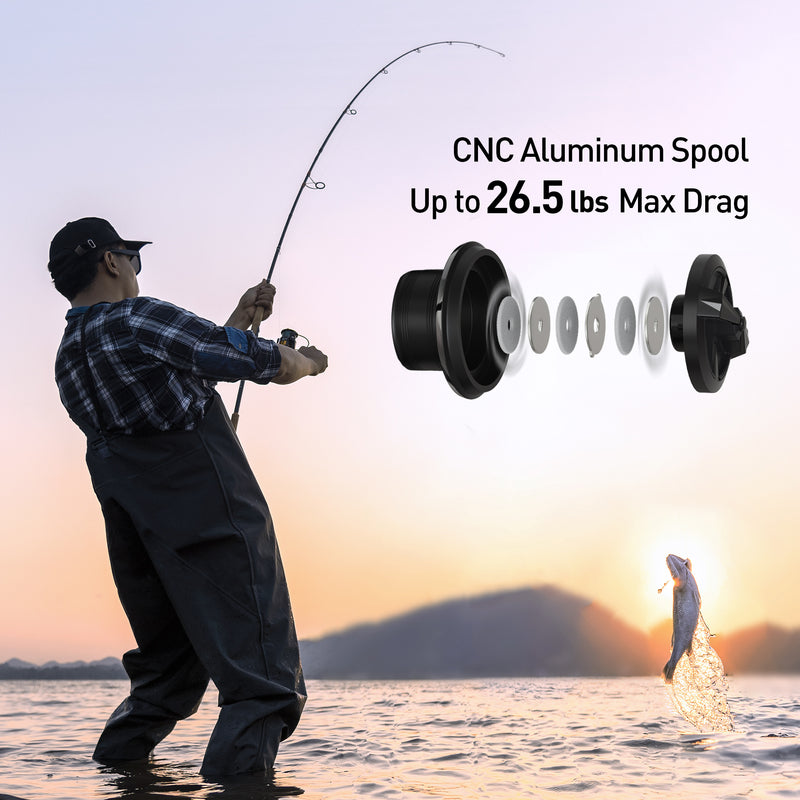Unlock the Secrets: Discover the Ultimate Fishing Reel for Bass Anglers!
Choosing the right fishing reel is crucial for any bass angler looking to enhance their fishing experience. With a myriad of options available, understanding the nuances of each type can significantly impact your success on the water. Key factors such as reel type, gear ratio, and personal fishing style play a pivotal role in the selection process. The objective of this article is to compare various types of fishing reels specifically designed for bass anglers, helping you make an informed decision that aligns with your fishing techniques and preferences.

Understanding Fishing Reels for Bass Fishing
When it comes to bass fishing, the three primary types of fishing reels to consider are spinning reels, baitcasting reels, and spincasting reels. Spinning reels are often favored by beginners due to their ease of use and versatility. They are great for light lures and finesse techniques, allowing for smooth casting and retrieval. On the other hand, baitcasting reels provide greater accuracy and control, making them ideal for heavier lures and precise presentations. However, they can be challenging for novice anglers to master. Spincasting reels, equipped with a closed face, combine some benefits of both spinning and baitcasting reels, offering simplicity while still being effective for bass fishing. Each reel type has its own advantages and drawbacks, making it essential for anglers to choose one that fits their experience level and fishing style.
Factors to Consider When Choosing a Fishing Reel
When selecting a fishing reel for bass fishing, several key factors should be taken into account. First, the drag system is vital; a smooth drag allows for better control when fighting a fish, preventing line breaks. Next, consider the gear ratio, which affects how fast you can retrieve your lure. A higher gear ratio means faster retrieval, which can be beneficial in certain fishing scenarios. Line capacity is another important factor, as it determines how much line your reel can hold, impacting your ability to catch larger fish. Lastly, weight plays a crucial role in comfort during long fishing sessions. A lightweight reel can reduce fatigue, allowing you to fish longer. Assessing these features based on your individual needs will help ensure you choose a reel that enhances your bass fishing experience.
Top Features of the Best Fishing Reels for Bass
Several features distinguish the best fishing reels for bass anglers. Durability is paramount; a reel that can withstand the wear and tear of frequent use in various environments will serve you well over time. Additionally, the smoothness of operation is critical; a reel that operates fluidly can make a significant difference in your ability to cast and retrieve lures effectively. Ease of maintenance is another essential feature; reels that are easy to clean and service will last longer and perform better. Lastly, features like corrosion resistance and quality materials can enhance the longevity of your reel, allowing you to focus more on fishing and less on equipment upkeep. By prioritizing these features, you can improve your overall fishing experience and increase your chances of landing that trophy bass.
Comparative Analysis of Fishing Reel Types for Bass
In the debate between spinning reels and baitcasting reels for bass fishing, both options have distinct advantages depending on the situation. Spinning reels are often preferred for finesse fishing techniques, especially when using lighter lures. They provide the ability to cast with greater distance and accuracy in windy conditions. Conversely, baitcasting reels excel in precision and control, making them ideal for heavy cover and larger lures. For instance, if you’re fishing in thick vegetation, the power and control of a baitcasting reel can be advantageous. On the other hand, if you're targeting bass in open water with lighter tackle, a spinning reel may be the better choice. Ultimately, the decision between the two types of reels comes down to personal preference and the specific fishing conditions you encounter.
Key Takeaways on Fishing Reels for Bass Angling
In summary, selecting the right fishing reel for bass fishing is a decision that should not be taken lightly. From understanding the different types of reels to considering crucial factors like drag systems and gear ratios, it’s essential to evaluate your specific needs and preferences. The features that enhance durability, smoothness of operation, and ease of maintenance will significantly impact your fishing experience. Whether you opt for a spinning reel or a baitcasting reel, remember to consider your fishing style and the conditions you typically face. With the right reel in hand, you’ll be well-equipped to tackle any bass fishing adventure that comes your way.







